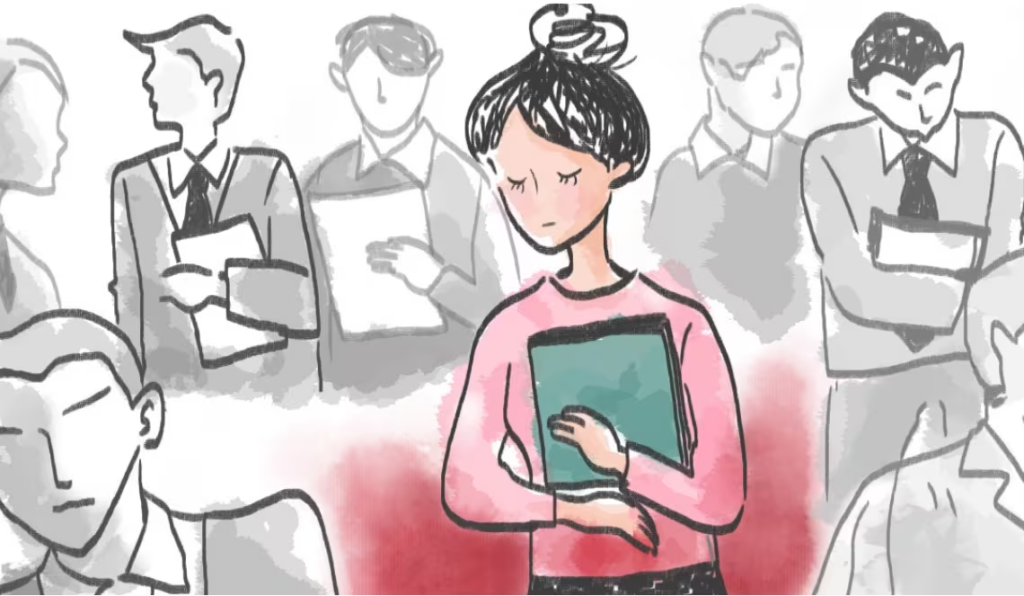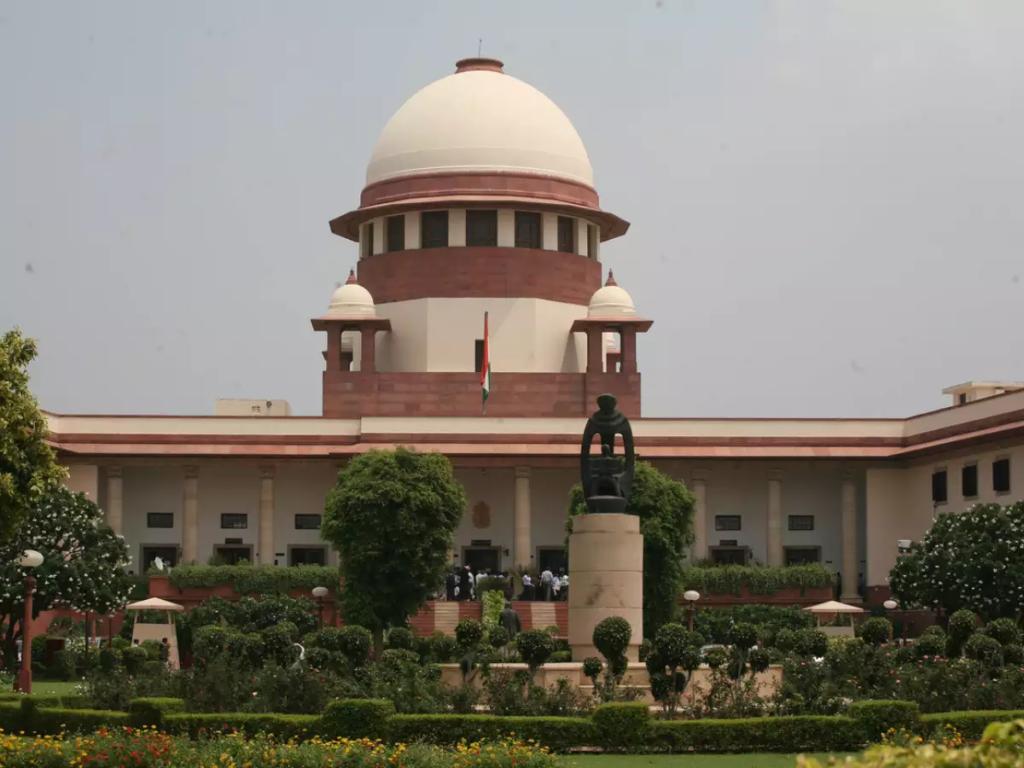
Source: Feminisminindia.com
Ok, imagine this. Every now and then, you get a godawful migraine where the slightest sound or teeniest bit of light leaves you in absolute agony.
Would you go to work? Could you?
Or put it another way, would you expect an employee to report to work in that condition?
Now imagine, that employee is a woman, not one who gets the usual uncomfortable menstrual cramps but the one with acute pain—abdominal cramping, nausea, diarrhea, pain in the legs, lower back and lower abdomen, fainting, headaches–that up to 29% of women experience.
Would you really expect her to turn up to work?
This week the Supreme Court was asked to consider whether women and girls could take time off from work and school if they suffered painful periods. The three-judge bench headed by Chief Justice DY Chandrachud said it was a policy matter that should be taken up by the ministry for women and child development.
Filed by Shailendra Mani Tripathi, the public interest litigation came up for hearing just days after Spain became the first European nation to allow three days of paid menstrual leave a month and less than a month after Kerala’s higher education department said it would grant menstrual leave for students at universities that come under it.
“Looking around, and in my own house, I really thought the patriarchal approach and taboo around menstruation must come to an end,” Tripathi told Bar&Bench.

An old argument
Nearly half of those who menstruate experience some level of period pain, medically known as dysmenorrhea. For some, this pain can be debilitating.
[Find out more about dysmenorrhea, its causes and symptoms, here, here and here.]

Source: dhyeyaias
Dysmenorrhea strikes every month. If you use up your regular paid sick leave for it (in most places 10 days a year), you will (a) Still not have enough days off. And (b) Use up all your medical leave and have none left should you get any other ailment.
The argument against granting paid period leave is one that I’ve been hearing in different contexts for some years now: That it will result in a greater reluctance to hire women in a country where female workforce participation is already an abysmal 25.1% according to the latest Periodic Labour Force Survey.
Reluctance to hire women is what we heard when the workplace sexual harassment law was enacted in 2013 and front pages were filled with stories of how nobody would hire women because they were scared the law would be “misused”.
Then again when paid maternity leave was increased from 12 to 26 weeks, the same voices of doom proclaimed the end of women in the workplace.
And yet, here we are.
On the other hand, we do know the unacceptable cost women pay simply for bleeding. In the sugarcane fields of Beed, one of the poorest districts in Maharashtra, women workers are forced by contractors and even their own families to undergo hysterectomies to avoid the messy business of pregnancies and periods. A 2018 survey by the Maharashtra state women’s commission found a 36% average for hysterectomies in the district, as opposed to the national average of 3.2%, reports the website Feminism in India.
Period leave in India and abroad

The issue of paid menstrual leave has been raised earlier – in 2020 in the Delhi high court. Back then, the court had asked the central and Delhi governments to consider the petition for women government employees, including daily wage and contract workers.
In recent years, it’s also popped up in Parliament, most recently when Congress MP from Kerala, Hibi Eden said he planned to introduce a private member’s bill that includes paid leave as well as free access to menstrual health products.
Asia has been surprisingly progressive about paid menstrual leave. It’s been there in Japan since 1947. A 2014 government study found that less than 0.9% of women had actually taken such leave (let that sink in, all you who fear about “misuse” of such leave).
It’s there in Indonesia, in the Philippines, in Taiwan, in Vietnam and further away from Asia, in Zambia where it’s called a Mother’s Day and women can just call and say they won’t be coming to work – no questions asked.
India’s private sector seems to have caught on. In 2020, Zomato announced 10 days of period leave a year. Swiggy and Byjus also have a provision for some leave.
Among the states, Bihar announced paid menstrual leave, two days a month, as far back as 1992.
The silver lining around the debate of paid menstrual leave is this: Normalizing the conversation around menstruation.
Once a taboo subject, menstrual hygiene is now more routinely spoken with even a mainstream movie, Padman, about it. All over the world, access to period products is being seen as an urgent issue with the Human Rights Council in Geneva hosting its first ever panel discussion on menstrual health in June 2022.

Gloria Orwoba, a Kenyan senator campaigning to end shame about periods. (Source: BBC)
But some things are still hard to stomach. On February 14, Kenyan politician Gloria Orwoba turned up at Parliament in a white pantsuit stained red. The blood was fake since Orwoba wanted to prove a point about period shame. Clearly she succeeded when she was asked to go home and change. She went instead to a school where she distributed free sanitary napkins.
Weigh in: Should employed women be granted paid menstrual leave? Write to me at: namita.bhandare@gmail.com)

In numbers
95.5% of women are unaware of changes to the abortion law which increases gestational age from 20 to 24 weeks. Just 40% even knew abortion is legal in India.
Source: Foundation for Reproductive Health Services in India study in Delhi, Maharashtra, Rajasthan and Uttar Pradesh, published in January 2023
Going places
Nagaland does exceedingly well on several gender indices including literacy, health, participation in key household decisions, age of marriage—all well above the national average and crimes against women—well below it. But, inexplicably, in the 60 years and 13 assembly elections since it became a state in 1963, it has never elected a woman MLA.
That jinx has finally been broken with the election of two women, both from the National Democratic Progressive Party.

Salhoutuonuo Kruse (left) and Hekani Jakhalu
Hekani Jhakalu, a US-educated lawyer, social entrepreneur and founder of YouthNet won from Dimapur III on a campaign that stressed youth development, women empowerment and minority rights. The other winning candidate, Salhoutuounuo Kruse who won with a margin of just seven votes, is a local hotel owner who has been an activist with civil society organisations, including the Angami Women Organisation. She has been elected from Western Angami
Watch

Click to watch
Launched on March 1, this ad by Viacom for the inaugural WPL has already had 2.3 million views. It captures everything good about girls and sport: Aspiration, hard work, hope and the belief that girls just want to play.
(Hat-tip to the excellent Splainer for this)
News you may have missed
So, nobody raped the Dalit gang-rape victim in Hathras?
The CBI had charged the four men with gang-rape and murder. The Allahabad high court said the crime and its aftermath had shocked its conscience.
Now a special court in Uttar Pradesh has acquitted three of the four dominant-caste men accused of gang-raping and killing a 19-year-old Dalit woman in Hathras in September 2020. A fourth, Sandeep Sisodia has been convicted, not of rape and murder, but culpable homicide and offences under the SC/ST act. He has been sentenced him to life imprisonment and a Rs 50,000 fine.

In her dying statement, the woman had told the police that the men had dragged her from a field where she had been working. She died a fortnight later at Delhi’s Safdarjung Hospital of fractures and horrible mutilations that left her paralysed and struggling for breath. She was cremated secretly by the police in the middle of the night; her family denied a last chance to see her.
The woman’s lawyer Seema Khushwaha has said she will appeal against the decision and blamed “political influence” for the men’s acquittal.
Heart-breaking scenes over a child’s custody in the Bombay high court
After his mother’s death in 2019, the boy continued to live with his maternal grandparents. But when his grandmother died, his father got custody of the child from the Bombay high court. On Thursday, the 11-year-old was to be handed over to his father but cried in court and refused to go. Justices AS Gadkari and PD Naik declined to look at a video of the ruckus outside the court when the child refused to get into his father’s car and asked the Kasturba Nagar police station at Borivali (east) to ensure a smooth hand-over later in the day.
Field notes
Stuck at home
Over half of the women who live in urban India, or 53%, do not step out of their homes even once a day, finds a new study, Gender gap in mobility outside home in urban India. By contrast, only 14% of men stayed home through the day.
The age of women is an important factor of their mobility outside their homes. For instance, mobility reduces sharply from adolescence to young adulthood. It then remains stable at a low level before once again reducing for older adults. There is no such variation for men, except among older adults, finds the study authored by Rahul Goel of the Transportation Research and Injury Prevention Centre at IIT, Delhi.
The lack of mobility for women can be explained in terms of the time they spend on in-house activities. Other factors include adolescence or adulthood, marriage, living with one or more household members, having an infant at home, lower income and less education.
Read the study here.
The long(ish) read

Image credits: AP
It’s called a circus, but is more of a sexual diversity show with humour, song and dance under the big top. The Timoteo Circus, amongst the best known of Chile’s 120 circuses, has been fighting prejudice and discrimination against the LGBTQ community for more than half a century, reports Associated Press in this wonderful photo feature
More here.
AROUND THE WORLD
In Iran, hundreds of schoolgirls in at least 30 schools in 10 cities have suffered “mild poison” attacks over recent months. Starting in Qom, near the capital Tehran, reports of girls falling sick first began trickling in in November. Some politicians have suggested that the attacks were orchestrated by religious groups opposed to girls’ education, reports Reuters.
In England and Wales, there’s new law that raises the legal age of marriage to 18, reports BBC. Previously, 16 and 17-year-olds could marry with parental consent. The change, the government said, would help protect vulnerable children from forced marriages.
In Germany, the government released new directives for its diplomatic and development policy to invest more on gender equality, reports DW. Under the new guidelines, the country will lobby to prioritise women’s concerns worldwide. More equal societies, the government said, tend to suffer less from poverty and hunger and are more stable.
Before I go Happy International Women’s Day on March 8. Know more about what it is, its history and how you can support it here.
| Were you forwarded this email? Did you stumble upon it online? Sign up here. |
| That’s it for this week. Do you have a tip or information on gender-related developments that you’d like to share? Write to me at: namita.bhandare@gmail.com. Produced by Sukoon Wadhawan sukoon.wadhawan@partner.htdigital.in. |